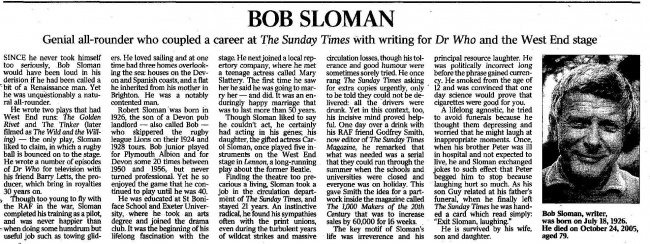Bob Sloman
- Publication: The Times
- Date: 2005-12-12
- Author:
- Page: 52
- Language: English
- Notes: Sloman wrote The Daemons, The Time Monster, The Green Death and Planet of the Spiders.
Genial all-rounder who coupled a career at The Sunday Times with writing for Dr Who and the West End stage.
SINCE he never took himself too seriously, Bob Sloman would have been loud in his derision if he had been called a bit of a Renaissance man. Yet he was unquestionably a natural all-rounder.
He wrote two plays that had West End runs: The Golden Rivet and The Tinker (later filmed as The Wild and the Willing) - the only play, Sloman liked to claim, in which a rugby ball is bounced on to the stage. He wrote a number of episodes of Dr Who for television with his friend Barry Letts, the producer, which bring in royalties 30 years on.
Though too young to fly with the RAF in the war, Sloman completed his training as a pilot, and was never happier than when doing some humdrum but useful job such as towing gliders. He loved sailing and at one time had three homes overlooking the sea: houses on the Devon and Spanish coasts, and a flat he inherited from his mother in Brighton. He was a notably contented man.
Robert Sloman was born in 1926, the son of a Devon pub landlord - also called Bob - who skippered the rugby league Lions on their 1924 and 1928 tours. Bob junior played for Plymouth Albion and for Devon some 20 times between 1950 and 1956, but never turned professional. Yet he so enjoyed the game that he continued to play until he was 40.
He was educated at St Boniface School and Exeter University, where he took an arts degree and joined the drama club. It was the beginning of his lifelong fascination with the stage. He next joined a local repertory company, where he met a teenage actress called Mary Slattery. The first time he saw her he said he was going to marry her -and did. It was an enduringly happy marriage that was to last more than 50 years.
Though Sloman liked to say he couldn't act, he certainly had acting in his genes; his daughter, the gifted actress Carol Sloman, once played five instruments on the West End stage in Lennon, a long-running play about the former Beatle.
Finding the theatre too precarious a living, Sloman took a job in the circulation department of The Sunday Times, and stayed 21 years. An instinctive radical, he found his sympathies often with the print unions, even during the turbulent years of wildcat strikes and massive circulation losses, though his tolerance and good humour were sometimes sorely tried. He once rang The Sunday Times asking for extra copies urgently, only to be told they could not be delivered: all the drivers were drunk. Yet in this context, too, his incisive mind proved helpful. One day over a drink with his RAF friend Godfrey Smith, now editor of The Sunday Times Magazine, he remarked that what was needed was a serial that they could run through the summer when the schools and universities were closed and everyone was on holiday.
This gave Smith the idea for a part-work inside the magazine called The 1,000 Makers of the 20th Century that was to increase sales by 60,000 for 16 weeks.
The key motif of Sloman's life was irreverence and his principal resource laughter. He was politically incorrect long be-fore the phrase gained currency. He smoked from the age of 12 and was convinced that one day science would prove that cigarettes were good for you.
A lifelong agnostic, he tried to avoid funerals because he thought them depressing and worried that he might laugh at inappropriate moments. Once, when his brother Peter was ill in hospital and not expected to live, he and Sloman exchanged jokes to such effect that Peter begged him to stop because laughing hurt so much. As his son Guy related at his father's funeral, when he finally left The Sunday Times he was handed a card which read simply: "Exit Sloman, laughing."
He is survived by his wife, son and daughter.
Bob Sloman, writer, was born on July 18, 1926. He died on October 24, 2005, aged 79.
Disclaimer: These citations are created on-the-fly using primitive parsing techniques. You should double-check all citations. Send feedback to whovian@cuttingsarchive.org
- APA 6th ed.: (2005-12-12). Bob Sloman. The Times p. 52.
- MLA 7th ed.: "Bob Sloman." The Times [add city] 2005-12-12, 52. Print.
- Chicago 15th ed.: "Bob Sloman." The Times, edition, sec., 2005-12-12
- Turabian: "Bob Sloman." The Times, 2005-12-12, section, 52 edition.
- Wikipedia (this article): <ref>{{cite news| title=Bob Sloman | url=http://cuttingsarchive.org/index.php/Bob_Sloman | work=The Times | pages=52 | date=2005-12-12 | via=Doctor Who Cuttings Archive | accessdate=23 December 2025 }}</ref>
- Wikipedia (this page): <ref>{{cite web | title=Bob Sloman | url=http://cuttingsarchive.org/index.php/Bob_Sloman | work=Doctor Who Cuttings Archive | accessdate=23 December 2025}}</ref>
